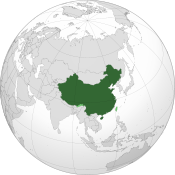Rescue efforts underway after China earthquake
Thursday, April 15, 2010
Humanitarian aid groups and Chinese military forces are beginning rescue operations in western China after a heavy 7.1 magnitude earthquake struck the region on Wednesday, that reportedly killed over 600 people and injured almost ten thousand.

The quake, which was centered around the remote town of Yushu, was largely destroyed by the heavy temblor, which occurred early in the morning as residents were waking up. The official death toll stands at 617, while 9,980 more were injured and an additional 313 reported as missing. The Chinese ministry of civil affairs reports that 15,000 houses had collapsed and 100,000 people - almost the entire population in the area - remain without homes.
The plateau where the earthquake hit is frequently visited by tremors; however, there are rarely many casualties due to its remoteness and small population. However, in May 2008 a heavy 8.0 magnitude earthquake struck near Sichuan foothills, killing 80,000 people.
Logistical problems
Rescue efforts are underway, but impeded due to the area's remoteness and landslides, which have blocked many roads in the area. Also a factor is the high altitude at which the area is located - about 4,000 metres above sea level (13,000 feet) - which could adversely affect rescue crews not used to being in such thin air. Sniffer dogs, for instance, who aren't accustomed to working at high sea levels, could have a harder time detecting living people buried beneath rubble.
Power and telephone lines were also downed by the temblor, affecting communication, although the authorities commented that electricity and phone links have been repaired to tens of towns.
China's state media reports that troops garrisoned in the Yushu county, with help from locals, have already rescued over a thousand people buried beneath debris.
Residents and troops garrisoned in the Yushu county have managed to pull out more than 1,000 people alive, according to Chinese state media. They are using shovels and bare hands.
Further exacerbating the situation is the weather: temperatures are freezing, and meteorologists predict sleet and wind to come within the next few days. Many people were forced to sleep outdoors, protecting themselves from the cold in blankets, or spending the night in vehicles.
Pierre Deve for the non-governmental organisation Snowland Service Group, was present in Yushu. He described the damage to Times Online, saying: "There are corpses everywhere on the street. They don’t have time to deal with them. There is a real need for medicine, for food, for water and for doctors. People are terrified that there will be another earthquake. They are also afraid that a dam that has been cracked will burst and flood the town."
A local doctor, Karma Sherab, also commented on the problems the area is facing: "Most of the hospitals have collapsed and others had become dangerous. The only thing we can do is to clean the wounds in a simple way or simply amputate instead of curing."
'Huge calamity'; leaders respond
Chinese president Hu Jintao, meanwhile, said that he would be dispatching over 5,000 rescuers and soldiers to the scene of the disaster; the government has pledged over US$29 million worth of aid. Hu described the quake as being a "huge calamity". He is also shortening his visit to a summit in Brazil to return to his country. "That is why I decided to bring forward my return to China," he said from Brasilia.
Premier Wen Jiabao has visited Yushu to oversee relief work; he decided to delay a visit to southeastern Asia due to the disaster. "As long as there is the slightest hope, we will make efforts that are 100-fold. Your disaster is our disaster, your suffering is our suffering."
The head of China's disaster relief department, Zou Ming, says that 120,000 articles of clothing, 120,000 quilts, food, and close to 40,000 tents were to be sent to the disaster zone; he encouraged people to donate money to assist in longer-term relief work.
Meanwhile, some foreign countries have offered financial help; among them is Japan, which has pledged over one million dollars to disaster victims. The United States also said it is "ready to assist" if China requests international aid.
Related news
- "6.9 magnitude earthquake hits western China" — Wikinews, April 14, 2010
Sources
- "Battle to reach China quake victims" — Al Jazeera, April 15, 2010
- "Chinese rescuers step up search for quake survivors" — BBC News Online, April 15, 2010
- "Search for survivors after China earthquake continues" — Times Online, April 15, 2010
- Agence France-Presse, Robert Saiget. "Rescuers struggle as China quake toll rises to 760" — Yahoo! News UK & Ireland, April 15, 2010
- "Death Toll From Chinese Earthquake Rises to 760" — VOA News, April 15, 2010

